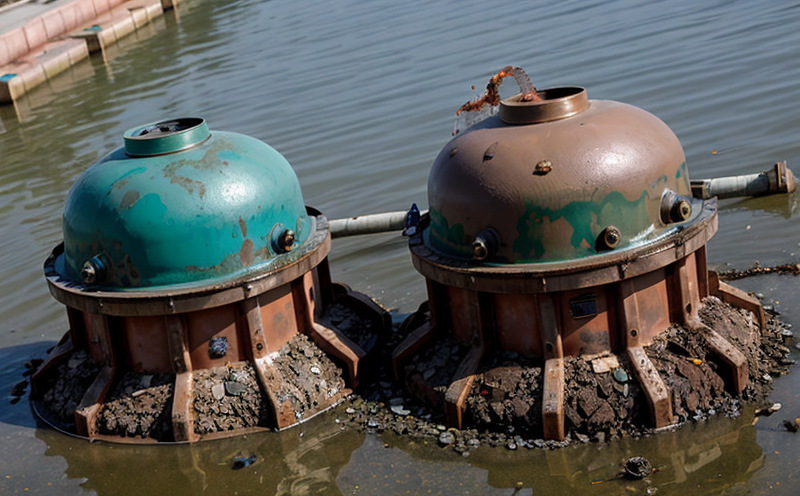ISO 9227 CASS Coated Materials Corrosion Testing
The International Organization for Standardization (ISO) specifies the ISO 9227 standard, which provides a method for assessing the resistance of metallic materials and coatings to atmospheric corrosion under controlled conditions. This testing is particularly significant in sectors such as aerospace, automotive, marine, and construction where exposure to environmental stressors can significantly impact material integrity.
The CASS (Constant Atlas Spray System) apparatus simulates the corrosive effects of a combination of humidity, salt spray, and heat, which are common atmospheric conditions found in coastal environments. This method is widely used for quality assurance in industries where materials must meet stringent durability standards under real-world exposure scenarios.
The testing protocol involves exposing specimens to controlled conditions that mimic the corrosive environment they would encounter in service. The process allows for the evaluation of the performance of coatings and materials under simulated environmental stressors, thereby ensuring their reliability over time. This is crucial for compliance with regulatory requirements and quality assurance purposes.
For instance, aerospace manufacturers rely on this testing to ensure that components can withstand harsh climatic conditions without degradation. Similarly, marine vessels are subject to corrosive environments due to saltwater exposure, making ISO 9227 testing indispensable in their design and maintenance processes. In the automotive industry, the standard is used to evaluate the durability of exterior paint finishes under simulated coastal or industrial environments.
The testing process typically involves placing specimens within a chamber that simulates an environment with high humidity levels (often between 93% and 95%) combined with salt spray. The temperature is maintained at a specific level, usually around 35°C, to accelerate the corrosion process for faster evaluation. This controlled exposure allows for the quantification of coating integrity over time.
One key aspect of this testing is the measurement of weight loss and visual assessment of changes in appearance or texture on the specimen surface. The results are then compared against established criteria to determine compliance with specified standards. Compliance officers and R&D engineers find this method particularly useful as it provides a reliable means of assessing material performance before deployment.
Another important aspect is the repeatability and reproducibility of the test results, which ensures consistency across different laboratories and testing facilities. This standardization is critical for industries that rely on international specifications to ensure uniform quality control measures are in place.
Applied Standards
| Standard Name | Description |
|---|---|
| ISO 9227:1998 | Determination of atmospheric corrosion resistance of metallic materials and coatings using a constant-atmosphere salt spray apparatus. |
| ASTM B117-03 | Ambient Salt Spray (Fog) Apparatus for Testing Corrosivity of Finishes. |
Scope and Methodology
The ISO 9227 CASS test is designed to evaluate the resistance of metallic materials and coatings to atmospheric corrosion in a controlled environment. The method involves exposing specimens to a combination of high humidity, salt spray, and heat, which are typical conditions found in coastal or industrial environments.
| Parameter | Description |
|---|---|
| Humidity | Controlled at 93% to 95% RH. |
| Salt Spray Concentration | Typically 5% NaCl solution. |
| Temperature | Maintained at approximately 35°C. |
The test duration can vary depending on the specific requirements of the industry or project, but it is commonly conducted for up to 1000 hours. During this period, the specimens are continuously exposed to the corrosive environment within the CASS chamber.
At the end of the exposure period, the specimens undergo a series of inspections and measurements. These include weight loss determination, visual inspection for changes in appearance or texture, and electrical resistance measurement where applicable. The results are then compared against established criteria to determine compliance with specified standards.
Eurolab Advantages
At Eurolab, we pride ourselves on delivering high-quality, reliable testing services that meet the stringent requirements of our clients. Our ISO 9227 CASS Coated Materials Corrosion Testing service is no exception. Here’s why you should choose us:
- Expertise and Experience: With a team of qualified and experienced professionals, we ensure that every test is conducted to the highest standards.
- State-of-the-Art Facilities: Our laboratories are equipped with advanced CASS chambers and other necessary equipment, ensuring accurate and reliable results.
- Comprehensive Reporting: We provide detailed reports that include all test parameters, results, and recommendations for improvement where necessary.
- Client-Centric Approach: Our services are tailored to meet the specific needs of our clients, ensuring that they receive the most relevant and applicable testing solutions.





